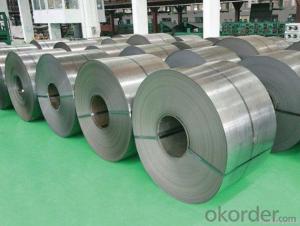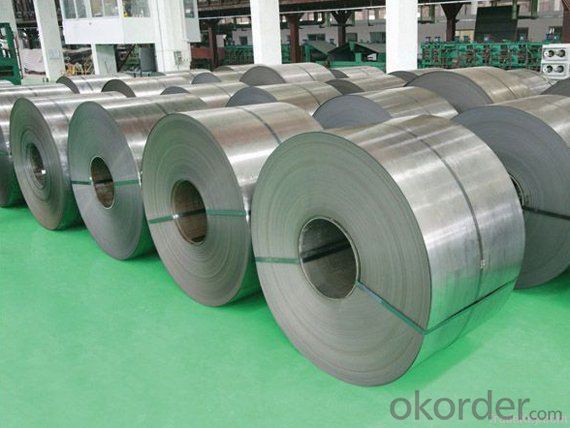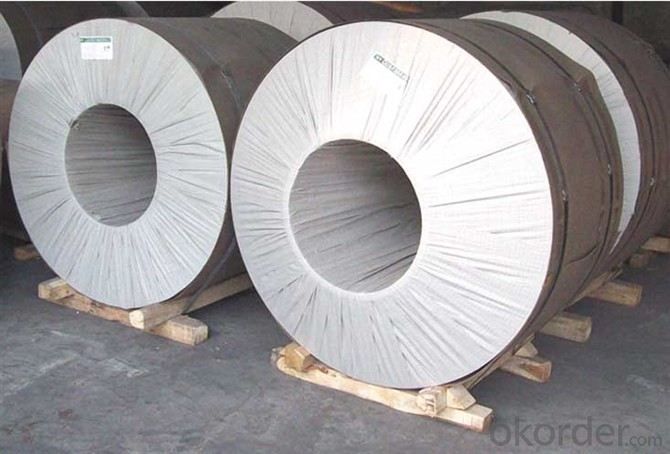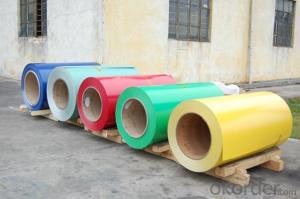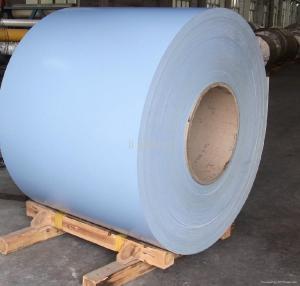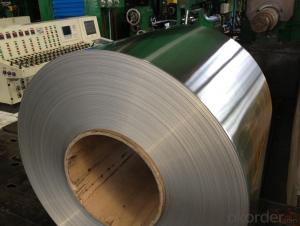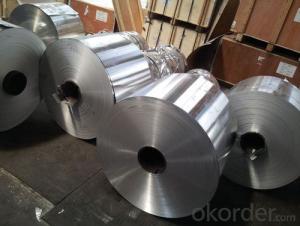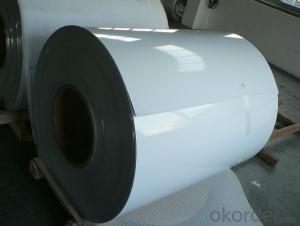1050 Aluminum Coils for Curtain Wall Materials Production
- Loading Port:
- Shanghai
- Payment Terms:
- TT OR LC
- Min Order Qty:
- 2 m.t.
- Supply Capability:
- 60000 m.t./month
OKorder Service Pledge
OKorder Financial Service
You Might Also Like
Specification
Aluminium Coil For Curtain Wall Materials Production
Alloy | 1050, 1060,1100, 3003 3004 3105 3A21 5005 5052 etc |
Temper | O/H12/H14/H1/H18/H32/H34/H36/H38//H111/H112/H116/H321/T6/T651/T3/T351 etc |
Thickness | 0.1mm to 6mm |
Width | 20mm to 3300mm |
Coil weight | 100kgs to 6 tons depends on actual requirement |
Core material | Aluminum or paper |
Coil inner diameter | 75mm, 150mm, 200mm, 300mm, 405mm, 505mm or as required |
Appplication | construction, roofing, decoration, lamping etc |
Package | eye to wall or eye to the wall for aluminum coil with wood pallet (wooded case also available) |
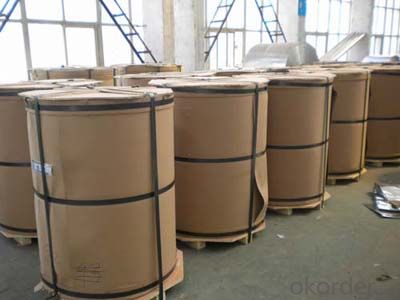
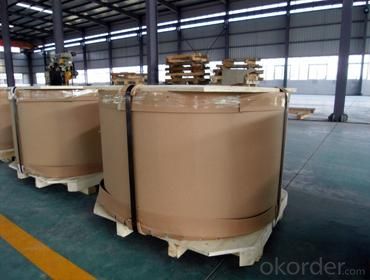
3) Glass curtain wall frame
4) Interior decoration
5) Elevator decoration
6) Signs, nameplate, bags making.
7) Automobile parts material
8) Office and Household appliances: HVAC equipments
9) The consumer electronics: mobile phones, digital cameras, MP3 .etc.
Coating varieties
Polyester Coatings (PE)
PE (polyester) coatings exhibit an excellent combination of hardness, flexibility, flow, appearance, and superior resistance to dirt retention in indoor and outdoor applications. These coatings are highly resistant to abrasion, metal marking, staining, and marring, and require minimal maintenance. Glazetech uses polyester paints which provide excellent colour and gloss retention properties.
Polyvinylidene Fluoride Coatings (PVDF)
PVDF (polyvinylidene fluoride) is a chemical resistant thick film barrier coating commonly used in architectural applications where both excellent appearance and substrate protection must be maintained over a long period of time. This coating is unaffected by most chemicals and solvents and has excellent wear and abrasion resistance. PVDF also has a high dielectric strength, excellent resistance to weathering and the ability to self extinguish.
FAQ
--Q: Do you provide free samples?
--A: Yes, free samples will be sent to you on freight at destination.
--Q: Can I get your latest products catalogue?
--A: Yes, it will be sent to you in no time.
--Q: What is the MOQ?
--A: 2 tons
--Q: What are your payment terms?
--A: We accept L/C, T/T.
--Q: What kinds of alloy can you supply?
--A: 1000 series: 1050, 1060, 1070, 1100, 1145, 1200
3000 series: 3003, 3004, 3105, 3104
5000 series: 5052, 5083, 5754, 5182
6000 series: 6061, 6063, 6062, 6063
8000 series: 8011, 8021
--Q: What’s the coating of top side?
--A: PVDF and PE coating
--Q: What kinds of temper can you supply?
--A: O-H112: O,H12,H14,H16,H18,H22,H24,H26,H,32,H34,H111,H112
T3, T4, T6
- Q: How are aluminum coils protected from damage during transportation?
- Aluminum coils are protected from damage during transportation through a combination of packaging materials and handling precautions. Firstly, the coils are typically wrapped with protective materials such as stretch film or plastic wrap to prevent scratches and abrasions. This helps to maintain the integrity of the coil surface and prevent any potential damage. In addition to the outer wrapping, the coils are often placed on sturdy wooden pallets or skids to provide a stable base for transportation. This helps to minimize any movement or shifting during transit, which could otherwise lead to dents or deformations in the coils. Furthermore, coils may be secured using steel or plastic strapping to further ensure their stability and prevent any unintended unwrapping or unrolling. These straps are tightly fastened around the coils and pallets, creating a secure bundle that can withstand the potential jostling and vibrations that occur during transportation. During loading and unloading, specialized equipment such as forklifts or cranes are used to handle the coils with care. This minimizes the risk of dropping or mishandling, which could cause significant damage to the coils. Overall, a combination of protective packaging materials, secure pallets, and careful handling procedures are employed to safeguard aluminum coils from damage during transportation. These measures aim to preserve the quality and structural integrity of the coils, ensuring that they arrive at their destination in optimal condition.
- Q: How to use aluminum sheet to roll a 12m-long aluminum coil with a diameter of 184cm?
- According to project experience, first you should check the specification of the aluminum sheet and then design crafts such as connection method, installation and transportation according to equipment.
- Q: This question asks about the environmental impact of aluminum coils, including potential effects on the ecosystem and human health.
- <p>Aluminum coils, when produced and used responsibly, have minimal environmental impact. However, improper disposal or manufacturing can lead to pollution. Aluminum production requires significant energy, contributing to greenhouse gas emissions. During manufacturing, if not managed properly, can release harmful substances into the air and water. Yet, aluminum is highly recyclable, reducing its environmental footprint over time. When disposed of improperly, aluminum can contribute to litter and leach harmful substances into the soil and water, affecting wildlife and potentially human health. Responsible recycling and manufacturing practices are crucial to mitigate these effects.</p>
- Q: What are the potential health hazards associated with the use of old aluminum coils?
- <p>Using old aluminum coils can pose health risks due to potential leaching of aluminum into food or beverages. Long-term exposure to aluminum may lead to cognitive impairments and neurological issues. Additionally, old coils may have accumulated dirt, bacteria, or other contaminants that could cause infections or digestive problems. It's important to regularly inspect and replace aluminum cookware to ensure safety.</p>
- Q: How are aluminum coils used in signage and advertising?
- Signage and advertising frequently utilize aluminum coils due to their versatility, durability, and cost-effectiveness. These coils are commonly employed in the creation of sign panels, which can be found in various locations such as billboards, retail stores, airports, and public spaces. One of the primary benefits of using aluminum coils in signage is their lightweight nature. This facilitates easier installation and transportation, making it the preferred choice for large-scale outdoor advertisements like billboards. Moreover, aluminum coils can be easily shaped and molded into various forms, enabling the creation of creative and attention-grabbing designs. Thanks to their durability, aluminum coils exhibit high resistance to weather conditions, including harsh sunlight, rain, and snow. This makes them exceptionally suitable for outdoor signage that needs to withstand the elements. The material's resistance to corrosion also ensures that the signage maintains its appearance over time, extending its lifespan and reducing maintenance costs. Additionally, aluminum coils can be coated or painted with different finishes, allowing for customization and branding. These finishes can range from vibrant colors to reflective or brushed effects, enhancing the visual impact of the signage. The smooth surface of aluminum coils also provides an excellent base for printing graphics and logos, resulting in high-quality and vibrant imagery. In terms of cost-effectiveness, aluminum coils are relatively affordable in comparison to other materials commonly used in signage, such as steel or plastic. The lightweight nature of aluminum also reduces shipping costs and simplifies installation, saving time and money for businesses or advertisers. Overall, aluminum coils play a critical role in the signage and advertising industry by providing a versatile, durable, and cost-effective solution for creating visually appealing and long-lasting signs. Their lightweight nature, resistance to weather conditions, customizable finishes, and affordability make them a popular choice for a wide range of signage applications.
- Q: Can aluminum coils be anodized for enhanced durability?
- Indeed, it is possible to anodize aluminum coils in order to enhance their durability. Anodization involves the creation of a layer of aluminum oxide on the surface of the aluminum, resulting in increased resistance to corrosion, wear, and scratches. This layer also offers added protection against UV rays and harsh environmental conditions. By subjecting aluminum coils to anodization, they become more resilient and capable of enduring extended use in a variety of industries, including construction, automotive, and electronics. Moreover, anodized aluminum coils can be further enhanced with additional coatings or finishes to improve their appearance and provide additional protection. Overall, anodizing aluminum coils is a widely employed and efficacious technique for boosting their durability and extending their lifespan.
- Q: How is Aluminum formed??Thanks!!
- I don't think any significant quantity of aluminum is produced by reduction with carbon - aluminum is too reactive for this to give a good yield. Instead, the metal is produced by electrolysis in the Hall-Heroult process. First, aluminum ore is processed to aluminum oxide in the Bayer process. This ore, bauxite, consists of aluminum oxides and hydroxides with some impurities, mostly iron oxides. The aluminum oxide/hydroxides are dissolved with concentrated sodium hydroxide in water. Iron oxides and hydroxides do not dissolve, and are filtered out. AlOOH (insoluble in water) + NaOH + H2O ----- NaAl(OH)4 (soluble in water) Neutralizing or cooling this solution will cause aluminum hydroxide to precipitate out. This is then heated strongly to drive off water and produce aluminum oxide. 2Al(OH)3 ----- Al2O3 + 3H2O This aluminum oxide can be melted and then electrolyzed to make the metal and oxygen gas. However, the melting point of aluminum oxide is very high, so it is dissolved in molten cryolite (Na3AlF6), which has a lower melting point. This is then electrolyzed, and molten aluminum collects at the bottom of the cell (cathode), where it can be drawn off. Because the oxygen that would be formed will attack most metal electrodes, a sacrificial carbon electrode is used for the anode and is oxidized to CO2. Very small amounts of aluminum metal occur in nature - it is usually found in association with fossil fuel deposits (which provide the reduced carbon necessary to reduce aluminum minerals).
- Q: What are the different types of surface treatments for aluminum coils?
- There are several different types of surface treatments available for aluminum coils. These treatments are designed to enhance the appearance, durability, and corrosion resistance of the aluminum. 1. Anodizing: This is a popular surface treatment method that involves creating a protective oxide layer on the surface of the aluminum. Anodizing can be done in various colors, which adds aesthetic value to the coils. It also improves resistance to corrosion and wear. 2. Painting: Aluminum coils can be coated with high-quality paints to provide a decorative and protective finish. The paint can be applied in a wide range of colors and finishes, such as matte, gloss, or metallic. Painting not only enhances the appearance but also provides additional protection against corrosion and UV rays. 3. Powder Coating: This is a process in which a dry powder is applied electrostatically to the aluminum coils and then cured under heat. Powder coating provides a durable and attractive finish that is resistant to chipping, scratching, and fading. It is available in a wide variety of colors and textures. 4. Chemical Conversion Coating: This treatment involves applying a chemical solution to the aluminum surface, which creates a thin layer of protective coating. The conversion coating improves the corrosion resistance of the aluminum and also provides a good base for subsequent paint or powder coating. 5. Brushing: Brushing is a mechanical surface treatment that involves using abrasive brushes to create a textured finish on the aluminum coils. This process can be used to achieve a brushed or satin-like appearance, which adds a unique aesthetic appeal to the coils. 6. Embossing: Embossing involves creating raised patterns or textures on the surface of the aluminum coils. This treatment not only enhances the visual appeal but also improves the strength and stiffness of the aluminum. Embossed coils are often used in architectural and decorative applications. Overall, the choice of surface treatment for aluminum coils depends on the specific requirements and desired appearance. Each treatment offers its own unique benefits in terms of durability, corrosion resistance, and aesthetic appeal.
- Q: Can aluminum coils be used in automotive manufacturing?
- Automotive manufacturing can indeed utilize aluminum coils. Aluminum, a versatile and lightweight substance, presents several advantages within the automotive sector. Frequently employed for fabricating components such as body panels, engine blocks, wheels, and heat exchangers, aluminum's incorporation in automotive manufacturing enhances fuel efficiency by reducing vehicle weight and subsequently minimizing energy consumption. Furthermore, aluminum boasts exceptional resistance to corrosion, rendering it appropriate for deployment in diverse weather conditions. In conclusion, the extensive benefits associated with the utilization of aluminum coils in automotive manufacturing have led to its widespread adoption by numerous car manufacturers.
- Q: What are the weight savings achieved by using aluminum coils?
- Compared to materials like steel, significant weight savings can be achieved by using aluminum coils. Aluminum, a lightweight metal with a density approximately one-third that of steel, allows for greatly reduced overall weight when utilizing aluminum coils instead of steel coils. The benefits of weight savings attained through aluminum coil usage are numerous. In industries such as automotive and aerospace, reducing weight is crucial for enhancing fuel efficiency and increasing payload capacity. Lighter vehicles and aircraft require less energy for operation and can accommodate more passengers or cargo, resulting in cost savings, improved performance, and minimized environmental impact. Moreover, the weight savings obtained from aluminum coils can provide practical advantages in other applications as well. For instance, in HVAC systems, lighter coils facilitate easier installation and transportation, thereby reducing labor and logistics costs. The actual weight savings achieved by utilizing aluminum coils will vary depending on the specific application and design specifications. Nonetheless, it is widely acknowledged that aluminum coils offer a significant weight advantage over alternative materials. The actual weight savings can range from 30% to 70% or more, depending on the specific comparison being made. To summarize, the weight savings achieved through the use of aluminum coils can be substantial. This lightweight material offers numerous benefits in terms of fuel efficiency, payload capacity, performance, and cost savings. When prioritizing weight reduction, aluminum coils are an excellent choice for a wide range of industries and applications.
Send your message to us
1050 Aluminum Coils for Curtain Wall Materials Production
- Loading Port:
- Shanghai
- Payment Terms:
- TT OR LC
- Min Order Qty:
- 2 m.t.
- Supply Capability:
- 60000 m.t./month
OKorder Service Pledge
OKorder Financial Service
Similar products
Hot products
Hot Searches
Related keywords
